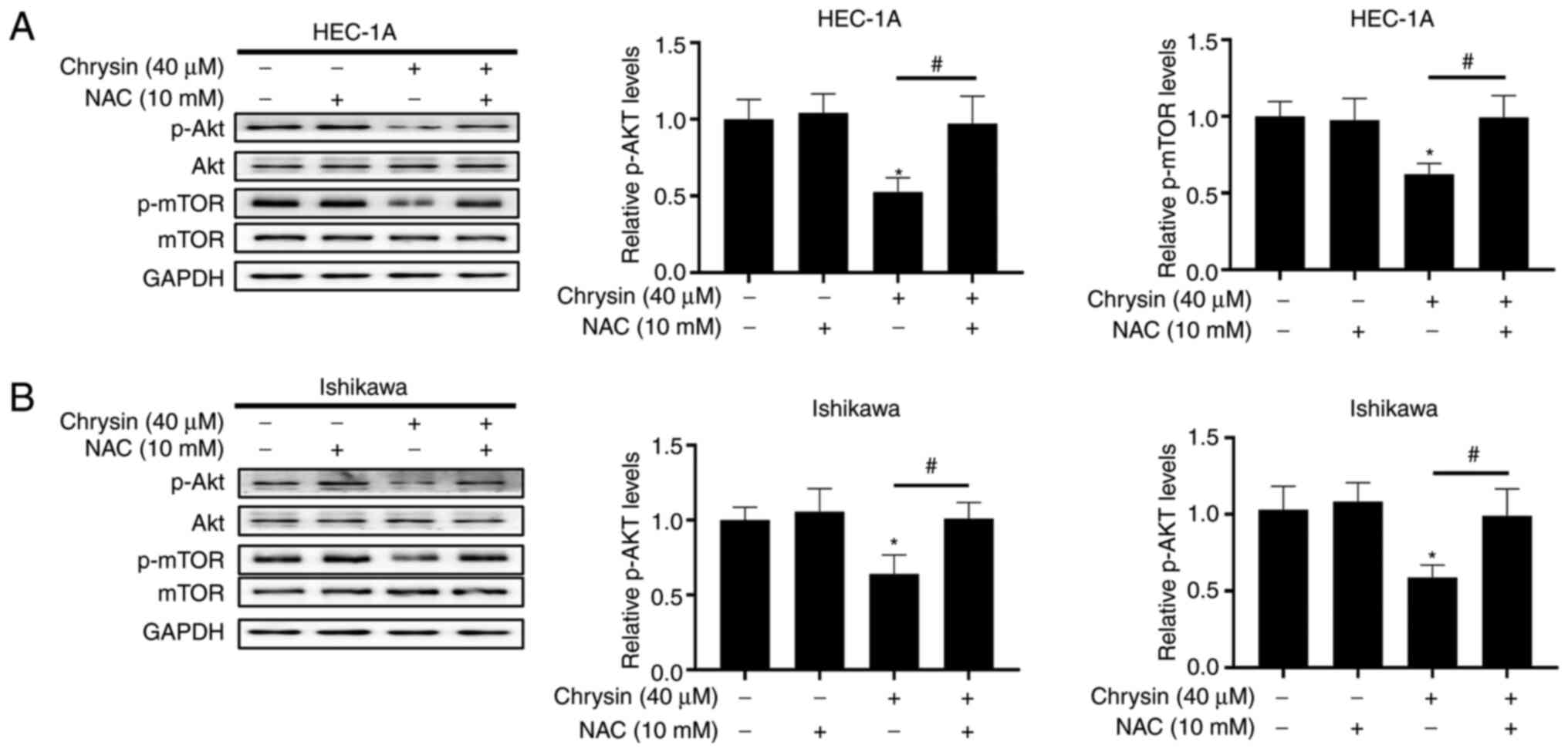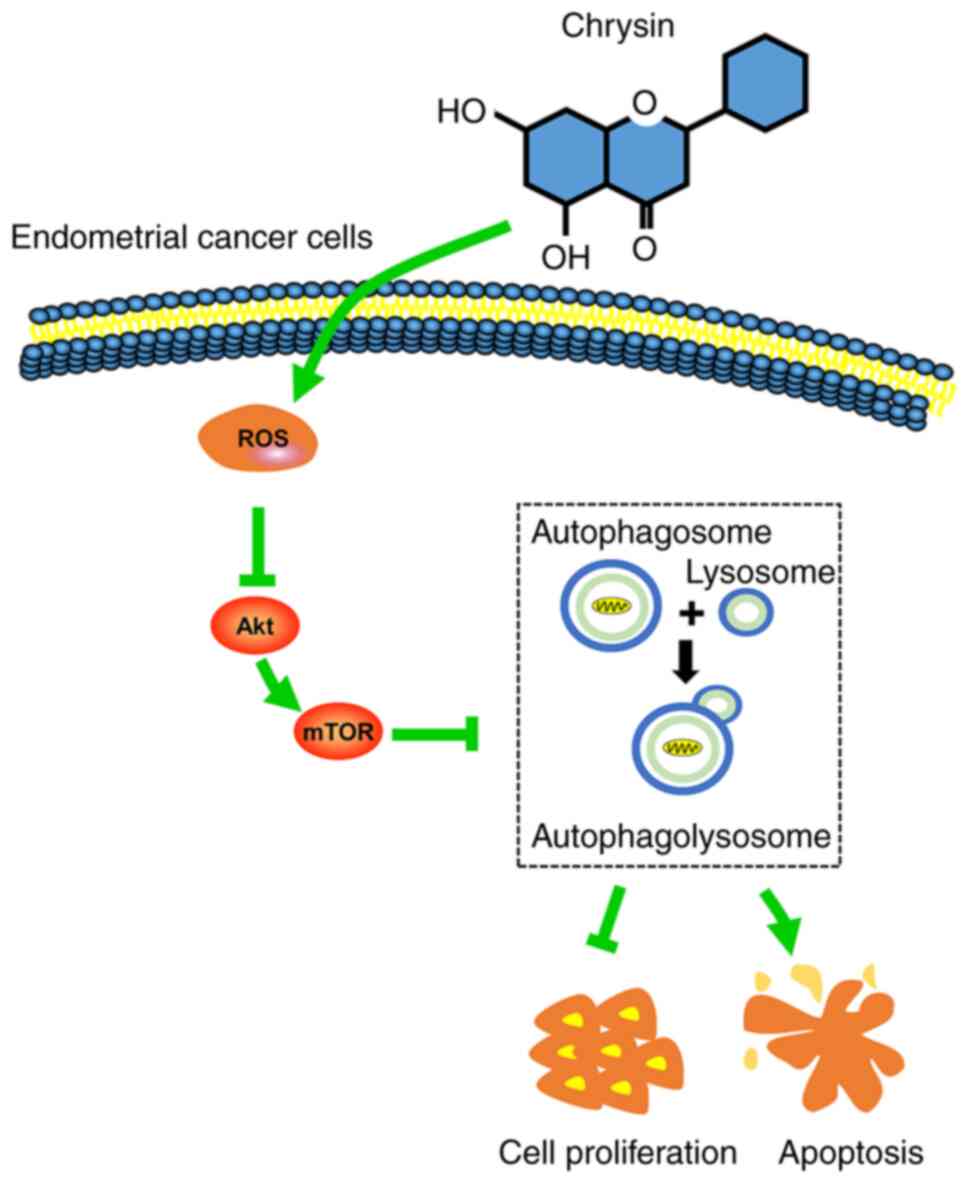|
1
|
Urick ME and Bell DW: Clinical
actionability of molecular targets in endometrial cancer. Nat Rev
Cancer. 19:510–521. 2019. View Article : Google Scholar : PubMed/NCBI
|
|
2
|
Troisi J, Raffone A, Travaglino A, Belli
G, Belli C, Anand S, Giugliano L, Cavallo P, Scala G, Symes S, et
al: Development and validation of a serum metabolomic signature for
endometrial cancer screening in postmenopausal women. JAMA Netw
Open. 3:e20183272020. View Article : Google Scholar : PubMed/NCBI
|
|
3
|
Clarke MA, Long BJ, Del Mar Morillo A,
Arbyn M, Bakkum-Gamez JN and Wentzensen N: Association of
endometrial cancer risk with postmenopausal bleeding in women: A
systematic review and meta-analysis. JAMA Intern Med.
178:1210–1222. 2018. View Article : Google Scholar : PubMed/NCBI
|
|
4
|
Korets SB, Czok S, Blank SV, Curtin JP and
Schneider RJ: Targeting the mTOR/4E-BP pathway in endometrial
cancer. Clin Cancer Res. 17:7518–7528. 2011. View Article : Google Scholar : PubMed/NCBI
|
|
5
|
Rai R, Essel KG, Benbrook DM, Garland J,
Zhao YD and Chandra V: Preclinical efficacy and involvement of AKT,
mTOR, and ERK kinases in the mechanism of sulforaphane against
endometrial cancer. Cancers (Basel). 12:12732020. View Article : Google Scholar
|
|
6
|
Ma L, Zhang M, Zhao R, Wang D, Ma Y and Li
A: Plant natural products: Promising resources for cancer
chemoprevention. Molecules. 26:9332021. View Article : Google Scholar : PubMed/NCBI
|
|
7
|
Sauter ER: Cancer prevention and treatment
using combination therapy with natural compounds. Expert Rev Clin
Pharmacol. 13:265–285. 2020. View Article : Google Scholar : PubMed/NCBI
|
|
8
|
Song S, Gao K, Niu R, Wang J, Zhang J, Gao
C, Yang B and Liao X: Inclusion complexes between chrysin and
amino-appended β-cyclodextrins (ACDs): Binding behavior, water
solubility, in vitro antioxidant activity and cytotoxicity. Mater
Sci Eng C Mater Biol Appl. 106:1101612020. View Article : Google Scholar
|
|
9
|
Mani R and Natesan V: Chrysin: Sources,
beneficial pharmacological activities, and molecular mechanism of
action. Phytochemistry. 145:187–196. 2018. View Article : Google Scholar
|
|
10
|
Kasala ER, Bodduluru LN, Madana RM, Athira
KV, Gogoi R and Barua CC: Chemopreventive and therapeutic potential
of chrysin in cancer: Mechanistic perspectives. Toxicol Lett.
233:214–225. 2015. View Article : Google Scholar : PubMed/NCBI
|
|
11
|
Moghadam ER, Ang HL, Asnaf SE, Zabolian A,
Saleki H, Yavari M, Esmaeili H, Zarrabi A, Ashrafizadeh M and Kumar
AP: Broad-spectrum preclinical antitumor activity of chrysin:
Current trends and future perspectives. Biomolecules. 10:13742020.
View Article : Google Scholar :
|
|
12
|
Roy S, Sil A and Chakraborty T:
Potentiating apoptosis and modulation of p53, Bcl2, and Bax by a
novel chrysin ruthenium complex for effective chemotherapeutic
efficacy against breast cancer. J Cell Physiol. 234:4888–4909.
2019. View Article : Google Scholar
|
|
13
|
Brechbuhl HM, Kachadourian R, Min E, Chan
D and Day BJ: Chrysin enhances doxorubicin-induced cytotoxicity in
human lung epithelial cancer cell lines: The role of glutathione.
Toxicol Appl Pharmacol. 258:1–9. 2012. View Article : Google Scholar :
|
|
14
|
Zhang T, Chen X, Qu L, Wu J, Cui R and
Zhao Y: Chrysin and its phosphate ester inhibit cell proliferation
and induce apoptosis in hela cells. Bioorg Med Chem. 12:6097–6105.
2004. View Article : Google Scholar : PubMed/NCBI
|
|
15
|
Lima APB, Almeida TC, Barros TMB, Rocha
LCM, Garcia CCM and da Silva GN: Toxicogenetic and
antiproliferative effects of chrysin in urinary bladder cancer
cells. Mutagenesis. 13:geaa0212020.
|
|
16
|
Koff JL, Ramachandiran S and
Bernal-Mizrachi L: A time to kill: Targeting apoptosis in cancer.
Int J Mol Sci. 16:2942–2955. 2015. View Article : Google Scholar : PubMed/NCBI
|
|
17
|
Pang X, Zhang X, Jiang Y, Su Q, Li Q and
Li Z: Autophagy: Mechanisms and therapeutic potential of flavonoids
in cancer. Biomolecules. 11:1352021. View Article : Google Scholar : PubMed/NCBI
|
|
18
|
Crawley O, Opperman KJ, Desbois M, Adrados
I, Borgen MA, Giles AC, Duckett DR and Grill B: Autophagy is
inhibited by ubiquitin ligase activity in the nervous system. Nat
Commun. 10:50172019. View Article : Google Scholar : PubMed/NCBI
|
|
19
|
Ranieri R, Ciaglia E, Amodio G, Picardi P,
Proto MC, Gazzerro P, Laezza C, Remondelli P, Bifulco M and Pisanti
S: N6-isopentenyladenosine dual targeting of AMPK and rab7
prenylation inhibits melanoma growth through the impairment of
autophagic flux. Cell Death Differ. 25:353–367. 2018. View Article : Google Scholar :
|
|
20
|
Lin YM, Chen CI, Hsiang YP, Hsu YC, Cheng
KC, Chien PH, Pan HL, Lu CC and Chen YJ: Chrysin attenuates cell
viability of human colorectal cancer cells through autophagy
induction unlike 5-fluorouracil/oxaliplatin. Int J Mol Sci.
19:17632018. View Article : Google Scholar :
|
|
21
|
Garcia-Martinez T, Vendrell-Flotats M,
Martinez-Rodero I, Ordóñez-León EA, Álvarez-Rodríguez M,
López-Béjar M, Yeste M and Mogas T: Glutathione ethyl ester
protects in vitro-maturing bovine oocytes against oxidative stress
induced by subsequent vitrification/warming. Int J Mol Sci.
21:75472020. View Article : Google Scholar :
|
|
22
|
An Z, Tassa A, Thomas C, Zhong R, Xiao G,
Fotedar R, Tu BP, Klionsky DJ and Levine B: Autophagy is required
for G1/G0 quiescence in response to nitrogen starvation in
Saccharomyces cerevisiae. Autophagy. 10:1702–1711. 2014. View Article : Google Scholar : PubMed/NCBI
|
|
23
|
Nunez-Olvera SI, Gallardo-Rincon D,
Puente-Rivera J, Salinas-Vera YM, Marchat LA, Morales-Villegas R
and López-Camarillo C: Autophagy machinery as a promising
therapeutic target in endometrial cancer. Front Oncol. 9:13262019.
View Article : Google Scholar : PubMed/NCBI
|
|
24
|
Guo F, Zhang H, Jia Z, Cui M and Tian J:
Chemoresistance and targeting of growth factors/cytokines
signalling pathways: Towards the development of effective
therapeutic strategy for endometrial cancer. Am J Cancer Res.
8:1317–1331. 2018.PubMed/NCBI
|
|
25
|
Sharom FJ: ABC multidrug transporters:
Structure, function and role in chemoresistance. Pharmacogenomics.
9:105–127. 2008. View Article : Google Scholar
|
|
26
|
Crommentuijn MH, Maguire CA, Niers JM,
Vandertop WP, Badr CE, Würdinger T and Tannous BA: Intracranial
AAV-sTRAIL combined with lanatoside C prolongs survival in an
orthotopic xenograft mouse model of invasive glioblastoma. Mol
Oncol. 10:625–634. 2016. View Article : Google Scholar
|
|
27
|
Bronikowska J, Szliszka E,
Kostrzewa-Susłow E, Jaworska D, Czuba ZP, Bednarski P and Król W:
Novel structurally related flavones augment cell death induced by
rhsTRAIL. Int J Mol Sci. 18:12112017. View Article : Google Scholar :
|
|
28
|
Rybstein MD, Bravo-San Pedro JM, Kroemer G
and Galluzzi L: The autophagic network and cancer. Nat Cell Biol.
20:243–251. 2018. View Article : Google Scholar : PubMed/NCBI
|
|
29
|
Dou QH, Chen HN, Wang K, Yuan K, Lei Y, Li
K, Lan J, Chen Y, Huang Z, Xie N, et al: Ivermectin induces
cytostatic autophagy by blocking the PAK1/akt axis in breast
cancer. Cancer Res. 76:4457–4469. 2016. View Article : Google Scholar : PubMed/NCBI
|
|
30
|
Yao C, Liu BB, Qian XD, Li LQ, Cao HB, Guo
QS and Zhou GF: Crocin induces autophagic apoptosis in
hepatocellular carcinoma by inhibiting Akt/mTOR activity. Onco
Targets Ther. 11:2017–2028. 2018. View Article : Google Scholar : PubMed/NCBI
|
|
31
|
Amaravadi RK, Lippincott-Schwartz J, Yin
XM, Weiss WA, Takebe N, Timmer W, DiPaola RS, Lotze MT and White E:
Principles and current strategies for targeting autophagy for
cancer treatment. Clin Cancer Res. 17:654–666. 2011. View Article : Google Scholar : PubMed/NCBI
|
|
32
|
Ohnishi K, Yano S, Fujimoto M, Sakai M,
Harumoto E, Furuichi A, Masuda M, Ohminami H, Yamanaka-Okumura H,
Hara T and Taketani Y: Identification of dietary phytochemicals
capable of enhancing the autophagy flux in HeLa and Caco-2 human
cell lines. Antioxidants (Basel). 9:11932020. View Article : Google Scholar
|
|
33
|
Lu Y, Xiao L, Liu Y, Wang H, Li H, Zhou Q,
Pan J, Lei B, Huang A and Qi S: MIR517C inhibits autophagy and the
epithelial-to-mesenchymal (-like) transition phenotype in human
glioblastoma through KPNA2-dependent disruption of TP53 nuclear
translocation. Autophagy. 11:2213–2232. 2016. View Article : Google Scholar :
|
|
34
|
Kim K, Dayem AA, Gil M, Yang GM, Lee SB,
Kwon OH, Choi S, Kang GH, Lim KM, Kim D and Cho SG:
3,2′-Dihydroxyflavone improves the proliferation and survival of
human pluripotent stem cells and their differentiation into
hematopoietic progenitor cells. J Clin Med. 9:6692020. View Article : Google Scholar
|
|
35
|
Lewinska A, Adamczyk-Grochala J,
Deregowska A and Wnuk M: Sulforaphane-induced cell cycle arrest and
senescence are accompanied by DNA hypomethylation and changes in
microRNA profile in breast cancer cells. Theranostics. 7:3461–3477.
2017. View Article : Google Scholar : PubMed/NCBI
|
|
36
|
Ye S, Zhao T, Zhang W, Tang Z, Gao C, Ma
Z, Xiong JW, Peng J, Tan WQ and Chen J: p53 isoform Δ113p53
promotes zebrafish heart regeneration by maintaining redox
homeostasis. Cell Death Dis. 11:5682020. View Article : Google Scholar
|
|
37
|
Deng L, Gao X, Liu B, He X, Xu J, Qiang J,
Wu Q and Liu S: NMT1 inhibition modulates breast cancer progression
through stress-triggered JNK pathway. Cell Death Dis. 9:11432018.
View Article : Google Scholar : PubMed/NCBI
|
|
38
|
Yang CC, Tsai MH, Li KY, Hou CH and Lin
FH: Carbon-doped TiO2 activated by X-ray irradiation for
the generation of reactive oxygen species to enhance photodynamic
therapy in tumor treatment. Int J Mol Sci. 20:20722019. View Article : Google Scholar
|
|
39
|
Lim W, Ryu S, Bazer FW, Kim SM and Song G:
Chrysin attenuates progression of ovarian cancer cells by
regulating signaling cascades and mitochondrial dysfunction. J Cell
Physiol. 233:3129–3140. 2018. View Article : Google Scholar
|
|
40
|
Ru JY and Wang YF: Osteocyte apoptosis:
The roles and key molecular mechanisms in resorption-related bone
diseases. Cell Death Dis. 11:8462020. View Article : Google Scholar : PubMed/NCBI
|
|
41
|
Guglielmelli P, Barosi G, Rambaldi A,
Marchioli R, Masciulli A, Tozzi L, Biamonte F, Bartalucci N,
Gattoni E, Lupo ML, et al: Safety and efficacy of everolimus, a
mTOR inhibitor, as single agent in a phase 1/2 study in patients
with myelofibrosis. Blood. 118:2069–2076. 2011. View Article : Google Scholar : PubMed/NCBI
|
|
42
|
Zhou Y, Chen X, Qu N, Zhang B and Xia C:
Chondroprotection of PPARα activation by WY14643 via autophagy
involving akt and ERK in LPS-treated mouse chondrocytes and
osteoarthritis model. J Cell Mol Med. 23:2782–2793. 2019.
View Article : Google Scholar : PubMed/NCBI
|
|
43
|
Wang YX, Yang L, Wang HQ, Zhao XQ, Liu T,
Li YH, Zeng QX, Li YH and Song DQ: Synthesis and evolution of
berberine derivatives as a new class of antiviral agents against
enterovirus 71 through the MEK/ERK pathway and autophagy.
Molecules. 23:20842018. View Article : Google Scholar :
|
|
44
|
Ives A, Nomura J, Martinon F, Roger T,
LeRoy D, Miner JN, Simon G, Busso N and So A: Xanthine
oxidoreductase regulates macrophage IL1β secretion upon NLRP3
inflammasome activation. Nat Commun. 6:65552015. View Article : Google Scholar
|
|
45
|
Su Z, Burchfield JG, Yang P, Humphrey SJ,
Yang G, Francis D, Yasmin S, Shin SY, Norris DM, Kearney AL, et al:
Global redox proteome and phosphoproteome analysis reveals redox
switch in akt. Nat Commun. 10:54862019. View Article : Google Scholar : PubMed/NCBI
|
|
46
|
Huang CR, Chang TW, Lee CT, Shen CJ, Chang
WC and Chen BK: ARNT deficiency represses pyruvate dehydrogenase
kinase 1 to trigger ROS production and melanoma metastasis.
Oncogenesis. 10:112021. View Article : Google Scholar : PubMed/NCBI
|






















